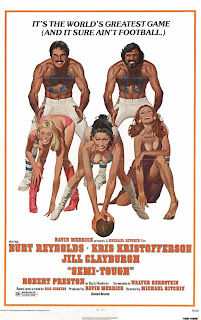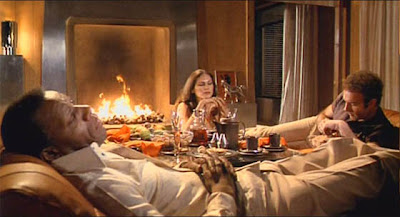One of the advantages of age is added hues of golden 20/20 hindsight when discussing retro-futurism in movies and for me age doesn't factor into any retrofuturist film more than ROLLERBALL (1975). Today I finally actually watched the whole damned thing (it came on TCM), and understood it, and was thrilled by it in that low-key adultly 70s thrilled way. Why did it take me so long? There are reasons. Roll with me...
ROLLERBALL was a film that seemed to come across the TV quite a lot when I was a child but frankly it seemed far too adult for me to understand and I didn't need a film to tell me football was a violent, icky business. Why bother criticizing our penchant for media violence with more violence? To know the answer you must understand the 70s, the last decade before cable TV and the VCR changed the fabric of American life. Prior to then there were only three major networks, plus PBS and a few local stations on the UHF antenna, and most of them signed off around four AM with the Star Spangled Banner. Football would dominate the ratings any night it was on. Everyone in the family almost had no other choice but to watch it--especially if the principal breadwinner (the dad) called the TV shots-- and because it was so universal it developed a dirty kind of bourgeois cache it doesn't have anymore. It became shared culture across all classes, ages, temperaments. Once families had two TVs, VHS and cable, only the dads stuck around. The intelligentsia moved upstairs to the other TV. Suddenly ROLLERBALL had no choir left to preach to.
And anyway, it was hard to understand the appeal of both football and ROLLERBALL on analog (square) TV, no matter how big the tube. Unless the TV was huge and your eyes 20/20 you had to take their word for it there was even a ball down there. Now they put a digital yellow line to mark first down and with the big HD widescreen even I can finally enjoy it. But back in the day, sports movies and sports action was hard to keep track of, just a lot of 'half images,' and the 'editing for television' endured by the raucous (R-rated) sports movies further abstracted the story into oblivion.
In short, TV was no place for ROLLERBALL. If you wanted the real flavor of caustic satire about the NFL and glorification of macho violence, you needed to get a babysitter and go out to the cinema, the R-rated adult-aimed 'mature' cinema. Little kids like me would have to hear what it was all about second hand, by kids who'd overheard their parents talking to other parents about it.
 |
 |
But today I salute the sports movies of the 70s. They were wild, woolly, untamed, sexual, manic, a bit thuggish but also warm-hearted, loyal, shaggy, and drunk off their asses. Nowadays guys get kicked off the team for so much as a single toke of weed. What the fuck is the point? In the 70s, they would have pissed on your shoes before they pissed in your cup.
 |
| smoking! today that would be a thousand dollar fine |
 |
| Semi-Tough |
But for ROLLERBALL, director Norman Jewison is clearly aiming for something loftier. Jeff Kuykendall theorizes Jewison was trying to ape Stanley Kubrick and turn the film into a kind of Clockwork Football:
The problem here is that one could simply summarize the premise of the film, and the message would be inherent: society craves violence and leans toward corruption. The result is a film which is frequently pretentious: grasping at profundity and failing to glance it. Death Race 2000, directed by Paul Bartel and released the same year, ironically succeeds where Rollerball fails, tackling almost the exact same story but delivering it with such over-the-top violence and comedy that the whole achieves the sublime (and on a Roger Corman budget). Perhaps Jewison should have let go of the Kubrick approach; though it’s fascinating to see what happened when John Boorman took the exact same tack for the even-more-ridiculous Zardoz. - Jeff Kuykendall - Midnight Only
 |

|
So sports movies were the rage along with car chase movies and truckers, in the mid-70s: aside from SEMI-TOUGH and NORTH DALLAS FORTY there was the tangentially-related BLACK SUNDAY (1977 - terrorist blimp attack at the Super Bowl); TWO-MINUTE WARNING (1976- assassin at the super bowl); SLAP-SHOT (1977 - brawling bespectacled brothers in hockey, below); BAD NEWS BEARS (1976 -smoking, beer-drinking, cursing in little league); THE LONGEST YARD (1974- prison football team); hell, even M*A*S*H (1969, but popular in the 70s) had a football game to satirize America's love of bloodsport.
And you can see the fundamental difference between today's and yesterday's sports movies with the remakes: The remake of BEARS loses the bulk of the profanity, smoking and drinking (so I hear), which mind you in the original was done by the kids; boy-man Adam Sandler replaces macho man Burt Reynolds in the remake of YARD; the remake of ROLELRBALL is a co-ed affair set more or less in the modern era on a sleazy Eastern European underground circuit, because America is so PC it's out of touch with good old bloodsport so they have to go where life is still cheap. The nanny state mentality makes it far less likely the heroes will bed numerous hotties and snort coke and shoot up steroids and more likely to cry at the bedsides of little dying kids, or scrape themselves up from poor neighborhoods, watched over by magical sober godparents. You know, like they did in the 40s, with the Catholic Legion of Decency breathing down their necks. What's our excuse?
In the 70s, you had games like this:
ROLLERBALL came out before both BAD NEWS BEARS and SEMI-TOUGH, but then again it's 'futuristic' and so is both ahead of the times as well as, now, behind them. Set in 2018, a lot of 'BALL's tropes have come true -- Caan pops in something between a DVD and an old mini-disc to watch home movies.... right there on the TV! In 1975! How did they know? And there's something like a TIVO and at one point Ralph Richardson kicks a big console computer intelligence that talks like a male version of Siri. And all the books ever written have been loaded into the computer-- though instead of being released as Kindle files they're summarized, i.e. stripped of any offending content or ideas that might run counter to the edicts of the shadowy ruling corporation and everyone knows that, um, today shadowy corporations don't control um... us.
But Jewison's 2018 is still a land without cellular technology and digital circuits so it's not that ahead of itself. They're still using punch cards and reel-to-reels and everything's huge and clunky. In the real future we get rid of all that heavy stuff, but keep the Ultimate Fighting Championship. Roll, baby!

As tough a warrior as he is, you can tell Caan's not very bright; he's like the kid who'd rather kill all his friends than let them play while he has to go into dinner. He mopes around at libraries and computer desks trying to get some books about the corporations but none are forthcoming. He really can't understand the motives of the corporation! He's too OLD! Dude, why can't they just say it to his face. Caan's kind of grandiose behavior wouldn't fly in Hollywood no matter how many millions he was worth.
And then Rebecca Romjin (left) in sexy pads in the remake lets us know that now the future is much less macho; it's also tied in with the Twitter generation so that the bad guys can watch their stocks in the franchise rise in value with every kill that happens live on TV. Yeesh!
So what does it all mean. Yes, the original film is still pretty boring so I'm proud I managed to get through it yesterday, partly due to nostalgia and the new widescreen HD TV I got making it easy to keep my eyes on the ball. In honor of my violist dad I also constantly mentioned aloud the names of all the classical music dirges being played by Andre Previn's orchestra on the soundtrack. Also, my subsequent drug experience allowed me to understand the goofy chilled-out attitudes of the partiers. No decade did decadent, spread-out party scenes like the 70s.
But most of all I liked the final ending, where we see Jonathan slowly skating around the corpse-strewn arena in a series of twisted freeze-frame close-ups, his face unrecognizably distorted, as if all the violence and death around him was something he'd been waiting for all this time, so he could devolve into a rabid subhuman pixelated blur. This is a man who will always be the last one standing, a veritable reverse Horatio, holding the Hamlet head of dystopia in his hands as it dies, but then morphing into Roy Batty crushing the skull of his maker.
Trouble is, nothing's ventured or gained in ROLLERBALL, just the struggles of an innocent corporation's TV ratings as an ancient prima donna tries to keep playing a young man's game. Based on the level of drug-free helicopter hovering over today's athletes, the corporate masters in ROLLERBALL seem now to be the good guys. As Houseman's shadowy corporate ruler notes of Caan's mustached sidekick after the opening game, "You rolled, you really rolled." He sure did. Houseman may be the ostensible villain, but hey - he likes a good show. Anyone try to roll like that now, boom! Tested positive for MDMA and out of the game! I say a corporation that doles out drugs and applauds all the things they profess to loathe is A-OK with me. So roll on, Big Daddy, roll on! You may have been druggy and sinister but you were part of that last gasp of the era wherein parents were allowed to be raunchy, excessive and mature at the same time. Now we don't even know how to spell half those words.







